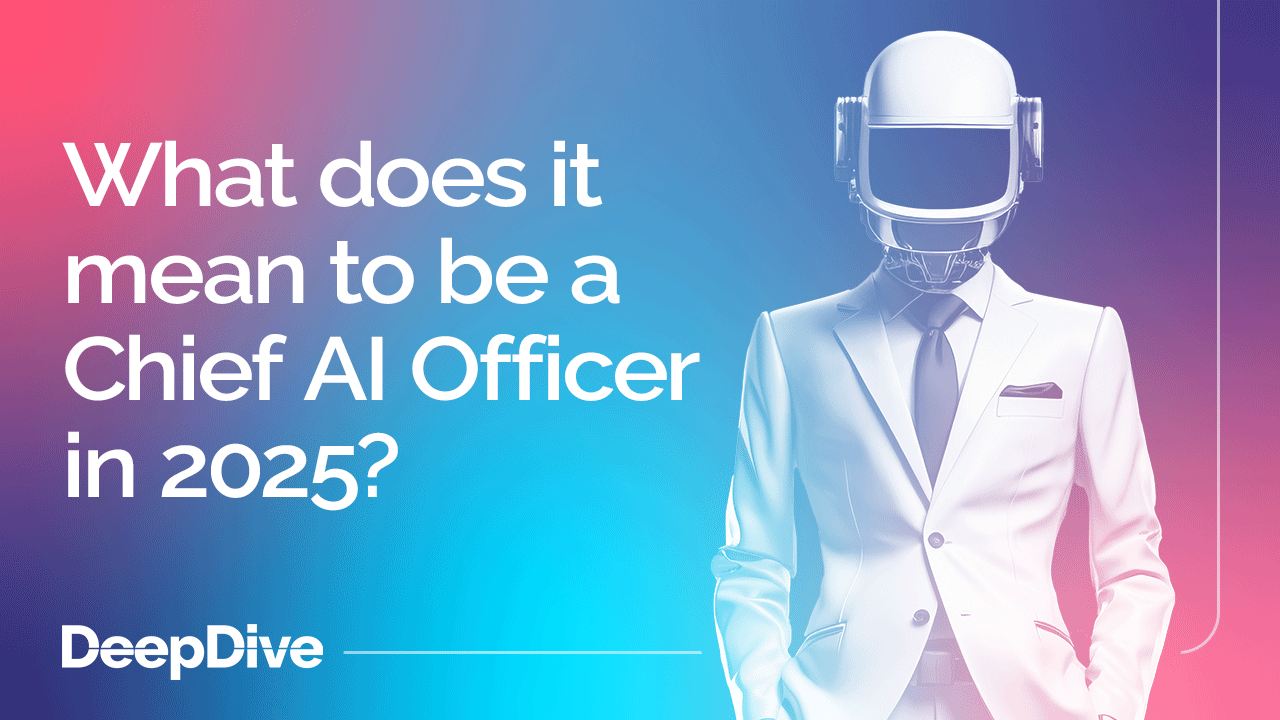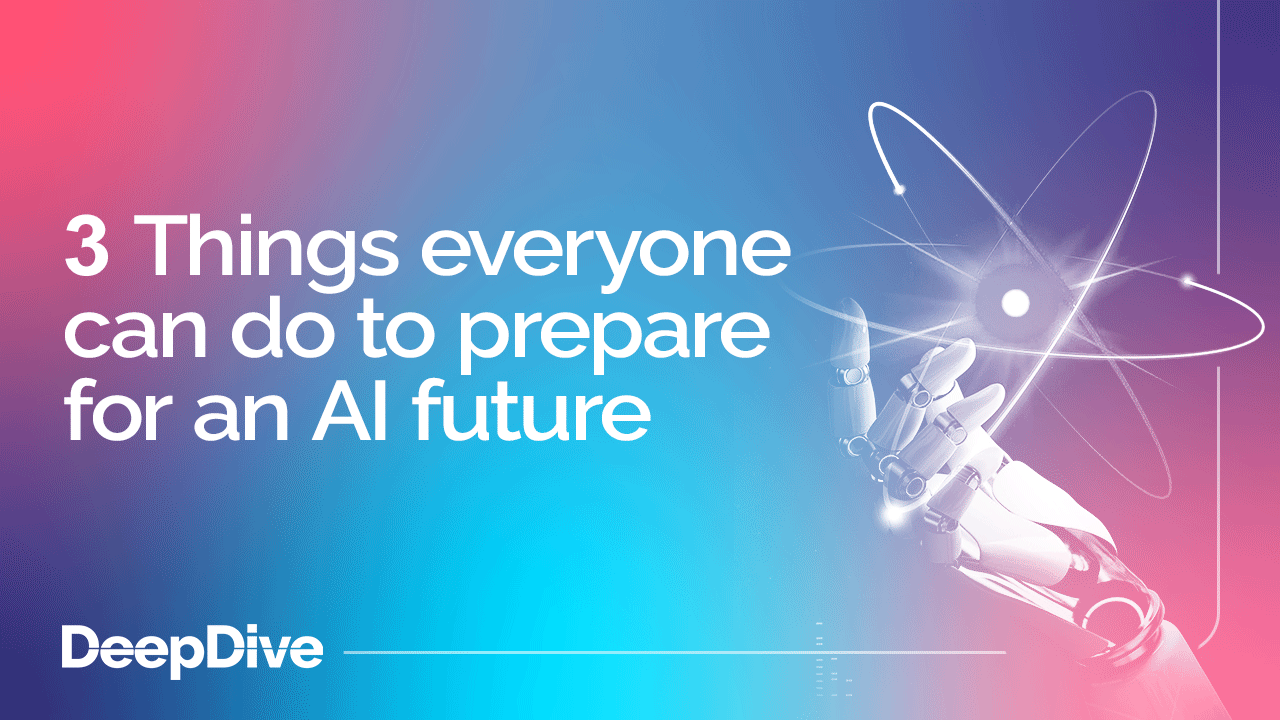

3 Things everyone can do to prepare for an AI future

Welcome to the 12 new deep divers who joined us since last Wednesday.
If you haven’t already, subscribe and join our community in receiving weekly AI insights, updates and interviews with industry experts straight to your feed.
DeepDive
Your weekly immersion in AI.
We’re in an echo chamber. And by we, we mean those of us who are immersed in the development of AI technology and culture. It’s on our minds all the time, we talk about it all the time, and to varying degrees, we understand where AI is right now and where it’s headed in the future.
Not everyone feels the same. Even though AI is already woven into our daily lives, the vast majority of people aren’t involved in conversations about it on a regular basis. They’re not actively seeking to understand how it’s going to affect their work and personal lives – or how they could choose to use it to influence their experience of life.
So what can those people do to prepare for an AI-driven future?
We’ve gathered knowledge from three leading minds in AI, and they all emphasised one key point: AI is here to stay. So understanding it will empower everyone to make the most of its benefits, while mitigating the risks.
1. Get educated about AI
One of the biggest mistakes people make is assuming AI is too complex to understand. The reality? There are more resources than ever to help you learn about it.
Lee Tiedrich (AI policy expert) highlighted the importance of education:
“I wish everyone knew that there is much they can learn about AI to help them understand how it’s transforming people’s lives. Knowledge can empower people to make choices that will help them make the most of AI’s benefits and protect themselves against the harms and risks.”
You don’t need a computer science degree to grasp the basics of AI. There are free and accessible courses on platforms like Coursera, Khan Academy, and YouTube. Start with AI ethics, generative AI, and machine learning fundamentals. Even dedicating an hour a week to learning about AI will put you ahead of most people.
And Tiedrich suggested that learning about AI can actually be an enjoyable experience:
“While more work needs to be done, there are increasingly more resources available to educate people about AI. And, learning about AI can be both interesting and fun!”
2. Understand AI’s limitations and ethical concerns
If you want to talk confidently about AI with your colleagues and friends, the first thing you should do is get your head around the ethical concerns surrounding it. It has biases and blind spots that AI developers have to work to address – and that everyone using AI should be aware of.
Yonah Welker (Explorer, Public Evaluator, Board Members - European Commission Projects) works at the intersection of AI, ethics, and accessibility. He warned that many AI systems are not designed for everyone:
“Algorithms may not properly identify individuals who lack limbs, with facial differences, asymmetry, speech impairment, different communication styles or gesticulations, or those who use assistive devices.”
Welker’s work highlights the importance of inclusive AI, to make sure these technologies serve all users, including those with disabilities. This is why staying informed about AI biases and challenges is so important. As AI becomes embedded in hiring processes, healthcare, and even legal decisions, we need to question how these systems work and who they might exclude – even if that exclusion is unintentional.
He also pointed out that language-based AI platforms should be scrutinised even more than other models:
“When compared to other AI systems, language-based platforms require even more attention and ethical guidance. In particular, they can imitate human behavior and interaction, involve more autonomy, and pose challenges in delegating decision-making.”
Do you use AI tools in your work or daily life? If you do, then take the time to understand their limitations. Look at studies about AI bias, read up on AI ethics, and advocate for policies that promote fairness and inclusivity.
3. Become an AI explorer in your everyday life
One of the best ways to prepare for an AI-driven future is to start using AI tools today. Henrik Kniberg (Co-founder of Ymnig.ai) suggested buying a Claude Pro account or ChatGPT Plus account so you have access to the best AI models.
And then once you have access, make AI part of your routine:
“Make a list of all the things you spend time on; look in your calendar or talk to your friends or colleagues. Every week (or every day), try using Claude or ChatGPT to help you with one of these tasks. If you don't know how, you can ask AI to help suggest how it can help you (pretty meta, but it works).”
Think of AI as a productivity tool rather than just a novelty. Use it to summarise long emails, brainstorm ideas, automate repetitive tasks, or even learn a new skill. The more you experiment, the better you’ll understand AI’s strengths and weaknesses.
In the future, experts expect that autonomous AI agents will work alongside humans in a wide variety of industries. Kniberg described them like this:
“An autonomous AI agent is an AI model... that is given access to tools (such as email, money, internet), and is able to act autonomously without waiting for a human to prompt it.”
These AI-powered agents are still in the early stages of development and experimentation, but Kniberg predicts they’ll go mainstream within a year. Getting comfortable with AI today will put you in a better position when these more advanced uses become the norm.
Don’t leave it until tomorrow
You don’t have to become an AI expert. But you do need to accept that AI is being integrated into human life – and especially work – in a vast array of different ways, and now is the time to get interested in it.
Be curious. Learn, explore, experiment. Allow yourself to consider the possibilities that AI might hold for you – and you’ll be able to position yourself to thrive in the future.
Do you have any tips?
AI folk – we’d love to know your tips to help everyone prepare for an AI future.





